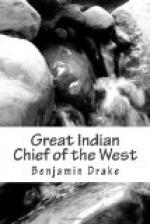with the British upon our north west, no satisfactory
information has been obtained. It appears that
he was in two engagements, but seems not to have distinguished
himself. The last of these was the attack, in
August 1813, upon Fort Stephenson, then under the
command of Major Croghan. The gallant defence
of this post, and the fatal repulse given to the combined
British and Indian forces, seem to have disheartened
Black Hawk; for soon afterwards, tired of successive
defeats, and disappointed in not obtaining the “spoils
of victory,” he left the army, with about twenty
of his followers, and returned to his village on Rock
river. It is probable that he would have remained
neutral during the remainder of the war, had it not
been for one of those border outrages, which lawless
and unprincipled white men but too often commit upon
the Indians, under pretence of self defence or retaliation,
often a mere pretext for wanton bloodshed and murder.
Previous to joining Colonel Dixon, Black Hawk had visited
the lodge of an old friend, whose son he had adopted
and taught to hunt. He was anxious that this
youth should go with him and his band and join the
British standard, but the father objected on the ground
that he was dependent upon his son for game; and,
moreover, that he did not wish him to fight against
the Americans who had always treated him kindly.
He had agreed to spend the following winter near a
white settler, upon Salt river, one of the tributaries
of the Mississippi which enters that stream below
the Des Moyens, and intended to take his son with him.
As Black Hawk was approaching his village on Rock
river, after his campaign on the lakes with Dixon,
he observed a smoke rising from a hollow in the bluff
of the stream. He went to see who was there.
Upon drawing near to the fire, he discovered a mat
stretched, and an old man of sorrowful aspect sitting
under it, alone, and evidently humbling himself before
the Great Spirit, by fasting and prayer. It proved
to be his old friend, the father of his adopted son.
Black Hawk seated himself beside him and inquired
what had happened, but received no answer, for indeed
he seemed scarcely alive. Being revived by some
water, he looked up, recognized the friend of his
youth, and in reply to Black Hawk’s second inquiry,
said, in a feeble voice,
“Soon after your departure to join the British, I descended the river with a small party, to winter at the place I told you the white man had requested me to come to. When we arrived, I found a fort built, and the white family that had invited me to come and hunt near them, had removed to it. I then paid a visit to the fort, to tell the white people that myself and little band were friendly, and that we wished to hunt in the vicinity of their fort. The war chief, who commanded it, told me that we might hunt on the Illinois side of the Mississippi, and no person would trouble us. That the horsemen only ranged on the Missouri side, and he had directed them




